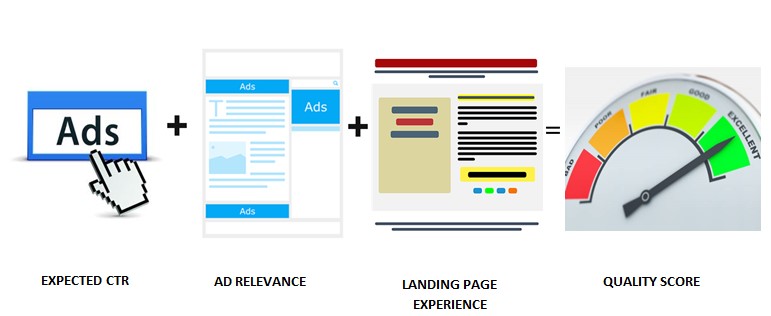Google wants its users to have the best experience by providing them only with relevant Ads and landing pages. And this is where Quality Score plays a role, by informing advertisers how well their campaigns perform and what they need to improve, to make their ads more clickable and relevant for users.
This article will help you know what quality score is and why it is important, as well as how to improve it.
What is a Quality Score?
Quality Score is Google’s measure of how relevant your ads, keywords, and landing pages are to the user by assigning a score on a 1-10 scale.
Every keyword in your Google Ads account is assigned a Quality Score. Every time someone searches for a particular keyword and an ad shows up, its Quality Score is calculated. There should be a specified number of impressions and clicks to have a Quality Score. Otherwise, it will not be displayed.
Why is it important?
A high quality score might help you avoid spending thousands of dollars throughout a campaign. Since,
- High Quality Score lowers your CPC, which in turn lowers your CPA.
- Better ad positions since Ad Rank =Quality Score x Max. Bid, This will result in more traffic to your website and a higher ROI.
If you want your Ad to appear in the Top position in the SERP, then leave it to our team at whitedigital.in

However, if your keyword’s quality score is relatively low, it might not be eligible to enter the auction. So if you get a low Quality Score it is only an indication that your landing page or ad copy needs to be improved, not that your campaign was unsuccessful.
Factors determining Quality Score
When Google calculates Quality Score, it takes into account three factors. They are
- Expected CTR: How likely your ad is to get clicked when displayed for that search term.
- Ad Relevance: How relevant the keywords are to the ad copy in a campaign.
- Landing Page Experience: How relevant and useful your website’s landing page will be to users who click your ad.
3 factors are categorized into:
- Above Average
- Average
- Below Average

When to & When not to Optimize
When your highest spending keywords have a low quality Score (i.e. <= 7), then you can consider optimizing the quality Score for that keyword so that you can get a low CPA which in turn leads to higher ROI.
But there are cases where you don’t need to keep on focussing on Quality scores and lose track of other important performance metrics. Like when,
- Keyword already has a high Quality Score (>7)
- The keyword is getting traffic but no conversions. Then consider other optimizations
- Keyword has low-volume
Ways to improve Quality Score
By improving the three main factors Expected CTR, Ad Relevance and landing Page Experience, you can optimize your Quality Score.
Expected Click-Through Rate
This is the most important metric for improving your quality Score. It has a high impact on your quality score. It measures the likelihood that your Ad will be clicked when it is shown.

If your Expected CTR is “Above Average” that means the Expected CTR for that keyword is good when compared to other competing keywords. But if your Expected CTR is “Average” or “Below Average“, then you should improve it by doing the following
- Write great Ads (Be more specific)
- Use Relevant Keywords
- Mention the USP’s of your product or service
- Use Attention grabbing CTA’s that would make users take action.
- Include as many relevant Ad Extensions as possible.
- Use Dynamic Keyword Insertion (DKI).
E.g. If you are a Business Law firm, then Attorney is a relevant Keyword. However, a user may search for a criminal attorney which is not the service you provide. This will negatively impact the CTR of the keyword, so consider more relevant keywords like Business Attorney.
Ad Relevance
Ad Relevance also has a huge impact on your Quality Score. Ad Relevance is more about “How related is your Ad to your Keyword?”.If your Ad relevance is “Below Average” then try following the steps below:
- Include best performing relevant keywords
- Be local (more relevant to the target region).
- Rewrite Ad copy for those with a low click-through rate.
- Review competitor ads (Top Most)
- Check that your Ad groups aren’t too broad. (i.e.)Don’t use one Ad to target too many related keywords at the same time. E.g. If you are a dentist keywords like “dental implants”, “sedation dentistry” and “Cosmetic dentistry” may be relevant but when they are all in the same Ad group and have the same Ad copy then there is less relevance. Therefore, split keywords into better-themed Ad groups.

Your Keywords relevance can also be improved by using long tail keywords, refining your keyword match types and adding Negative Keywords.
Landing Page Experience
It measures whether after clicking the ad and entering the site is the user satisfied or leaves the site immediately. If the Landing page Experience is “Above Average” or “Average”, it means that the user is satisfied with the site.

But if it is “Below Average”, then try improving it by following the steps below:
- Redirect the user to what they are looking e.g. if a person searches for birthday flowers, the landing page should lead them to that.
- Check if it is mobile-friendly
- Improve the page speed.
- Be sure that your Landing page has as many keywords as possible.
- It should be easy to navigate.
- Check the bounce rate.
- Check if there is Transparency & privacy (Terms& conditions).
Wrapping Up
Concluding, it can be seen that a good Quality Score leads to lower costs and better Ad position thereby increasing the ROI. So, when you get a low Quality Score, don’t be alarmed just follow the steps mentioned above to improve your Quality Score.
If you need help in improving your Quality Score, then contact the PPC experts at whitedigital.in













